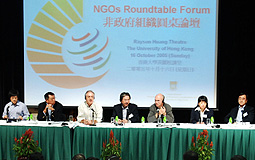 |
| All ears: At an NGO roundtable at the University of Hong Kong, Director-General Pascal Lamy (third from right) reminds the audience that the WTO has always recognised their important role in WTO matters and maintained positive dialogue with them. |

|
Recently-appointed WTO Director-General Pascal Lamy made a two-day visit to Hong Kong this month, ahead of the all-important Ministerial Conference in mid-December. He took this rare opportunity to talk to non-governmental organisations, to remind them of the important role civil society plays in shaping negotiation outcomes.
At an NGO roundtable forum at the University of Hong Kong, he reminded his audience - including representatives from more than 30 NGOs - that "our goal should be to work together to make the organisation better reflect our aspirations."
Whenever there is a major WTO meeting, non-governmental organisations' activities both inside and outside the conference venue quickly become the centre of attention.
Despite having a difference of opinion over certain issues with NGOs, the WTO has always recognised their interests and important role in WTO matters. The history and development of the relationship is excerpted below, from the WTO's NGO website.
The Marrakesh Agreement Establishing the WTO includes a specific reference to NGOs, providing that "the General Council may make appropriate arrangements for consultation and cooperation with non-governmental organisations concerned with matters related to those of the WTO".
Communication framework set
In July 1996, the WTO General Council further clarified the framework for relations with NGOs by adopting a set of guidelines which "recognises the role NGOs can play to increase the awareness of the public in respect of WTO activities".
These guidelines are instrumental for both members and the WTO Secretariat in maintaining an informal and positive dialogue with civil society.
To achieve greater transparency, members have agreed to ensure more information about WTO activities, in particular by making available documents which would be de-restricted more promptly than in the past.
To enhance this process, the secretariat makes available online the material which is accessible to the public, including de-restricted documents. The secretariat also plays a more active role in its direct contacts with NGOs.
Since 1996, arrangements for NGOs have essentially focused on attendance at Ministerial Conferences, participation in issue-specific symposia, and the day-to-day contact between the WTO Secretariat and NGOs.
NGO attendance allowed
NGOs are allowed to attend the conference's plenary sessions and their attendance at WTO Ministerial Conferences is based on a set of registration procedures decided by the WTO General Council.
They must demonstrate that their activities are "concerned with matters related to those of the WTO".
The Singapore Ministerial Conference in December 1996 represented the first experience with NGO attendance at a major WTO meeting. A total of 159 NGOs registered to attend that conference. The 108 NGOs (235 individuals) that made it to Singapore included representatives from environment, development, consumer, business, trade union and farmer interests.
The NGO Centre in Singapore provided the NGOs with meeting rooms, computer facilities and documentation from the official event.
The Geneva Ministerial Conference in 1998 in many ways epitomised the evolving relationship with NGOs and underlined civil society's growing interest in the work of the WTO.
A total of 152 NGOs registered for the Geneva event. In the end, a total of 128 NGOs (362 individuals) came to that meeting.
Throughout the three-day-event, NGOs were briefed regularly by the WTO Secretariat on the progress of the informal working sessions - a feature which was welcomed by NGOs as a genuine sign of commitment to ensure transparency and the recognition of civil society as an entity which deserves attention in its own right.
Record NGOs to attend MC6
The number of NGOs attending ministerial conferences have generally been rising, from over 100 NGOs at the first to almost 800 NGOs at the fifth.
NGOs' attendance at the WTO's 6th Ministerial Conference to be held in Hong Kong in December will likely set a new WTO record: More than 1,000 have already been accredited.
The Hong Kong conference will claim another first: For the first time, accredited NGO representatives and delegates will be housed under the same roof.
Since 1996 a number of symposia have been arranged by the secretariat for NGOs on specific issues of interest to civil society. These symposia have provided, on an informal basis, the opportunity for NGOs to discuss specific issues with representatives of WTO Member countries.
Other initiatives
The WTO Secretariat also receives a large number of NGO requests from all over the world and secretariat staff meet with NGOs on a regular basis - both individually and as a part of NGO-organised events.
Since 1998, new initiatives have been launched to enhance dialogue with NGOs.
The WTO Secretariat provides regular briefings for NGOs and establishes a special NGO Section on the WTO website with specific information for civil society. In addition, a monthly list of NGO position papers received by the Secretariat are compiled and circulated for members' information.
Go To Top
|



